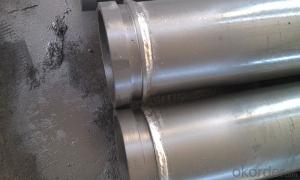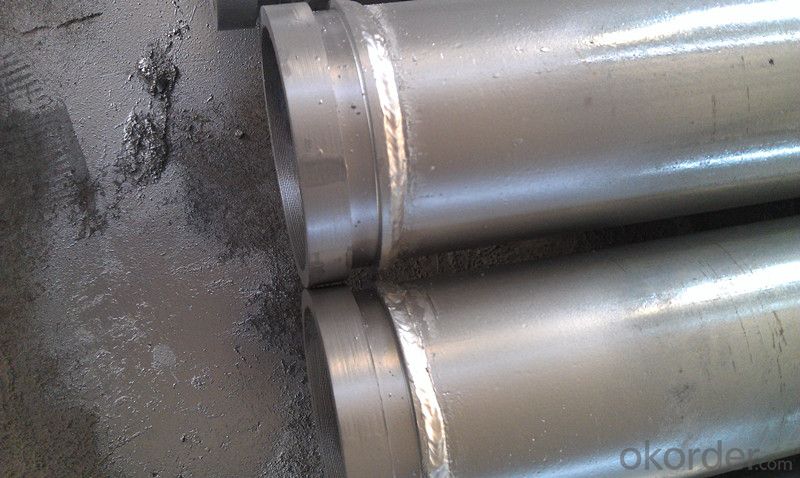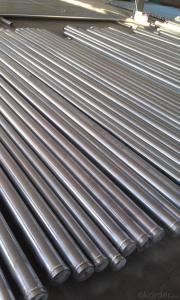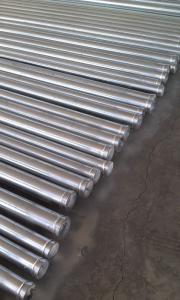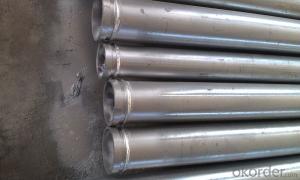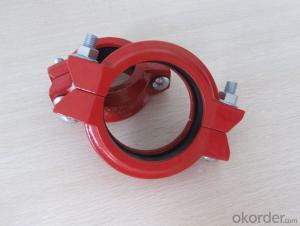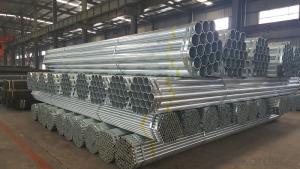Victaulic Shouldered Grooved Pipe For Mining and Tunnel
- Loading Port:
- China Main Port
- Payment Terms:
- TT OR LC
- Min Order Qty:
- -
- Supply Capability:
- -
OKorder Service Pledge
OKorder Financial Service
You Might Also Like
Product Name | Shouldered Grooved pipe |
Outside Diameter(mm) | 60.3mm-425mm |
Wall thickness(mm) | 2mm-20mm |
Certification | FM/UL; SGS/BV |
Standard | 1.ASTM A106/A53 GR.A; ASTM A106/A53 GR.B; ASTM A53/A106 GR.C 2.APL 5L GR.B, API 5CT J55, K55, N80 3.ASTM, BS,DIN, EN |
Grade | A, B, C, ST33, ST37, ST35.8, ST45-8, ST45-4, ST52 |
Place of Origin | Hebei Cina |
Face finished | 1.Manual polished 2.mechanical polished 3.black paint on the face 4.Shoulder Grooved on both ends 5.Galvanized or Colour Painting |
Export | Europe, South America, the Middle East, Africa, Asia and other countries and regions, well received by consumers! |
Process Method | 1.Cold Drawn 2.Cold rolled 3.Hot rolled 4. Hot expanded |
Application | Tube with hollow cross-section, a large number of channels for transporting fluids, such as the transportation of oil, natural gas, gas, water and some solid materials, pipes, etc.. |
Package | 1.Inner Packing:Caps at both ends, steel strong trips on every bundle 2.Outer Packing:Standard export package or as per clients' requirements |
- Q: What is the difference between steel pipe and fiberglass pipe?
- Steel pipe and fiberglass pipe are two different types of materials used for piping systems. One major difference between steel pipe and fiberglass pipe is the material they are made of. Steel pipe is made from steel, which is an alloy of iron and carbon. It is known for its strength and durability, making it a popular choice for various applications, including plumbing, construction, and industrial projects. On the other hand, fiberglass pipe is made from glass fibers embedded in a resin matrix. This combination results in a lightweight and corrosion-resistant material, making it suitable for applications where chemical resistance is required, such as in the chemical industry or wastewater treatment plants. Another difference between steel pipe and fiberglass pipe is their flexibility. Steel pipe is known for its rigidity and stiffness, which makes it less flexible than fiberglass pipe. This rigidity can be an advantage in certain applications where stability and strength are crucial, such as underground infrastructure or high-pressure systems. Fiberglass pipe, on the other hand, offers more flexibility, allowing it to bend and conform to different shapes and contours. This flexibility makes it easier to install in tight spaces or areas with complex geometries. Corrosion resistance is another important difference between steel pipe and fiberglass pipe. Steel pipe is susceptible to corrosion, especially in environments with high moisture or chemical exposure. To protect against corrosion, steel pipes are often coated with a layer of protective material or lined with corrosion-resistant coatings. In contrast, fiberglass pipe is inherently corrosion-resistant due to the nature of the materials used in its construction. This makes fiberglass pipe a preferred choice for applications where corrosion is a concern, such as in saltwater environments or chemical processing plants. Cost is another factor that differentiates steel pipe and fiberglass pipe. Steel pipe is generally more affordable than fiberglass pipe, especially for smaller diameter pipes. However, as the diameter and pressure rating increase, the cost of steel pipe can become significantly higher than fiberglass pipe. Additionally, fiberglass pipe requires less maintenance and has a longer lifespan, which can offset the initial cost difference over time. In summary, the main differences between steel pipe and fiberglass pipe lie in the materials they are made of, their flexibility, corrosion resistance, and cost. Steel pipe offers strength and rigidity but is prone to corrosion, while fiberglass pipe is lightweight, flexible, corrosion-resistant, and often more expensive. The choice between these two types of pipes depends on the specific requirements of the project, including factors such as the application, environment, budget, and lifespan expectations.
- Q: How are steel pipes used in the manufacturing of conveyor systems?
- Steel pipes are commonly used in the manufacturing of conveyor systems as they provide a sturdy and durable framework for supporting and transporting materials. These pipes are used to create the structure of the conveyor, forming the framework that holds the rollers, belts, and other components in place. Steel pipes also allow for easy customization and flexibility in designing conveyor systems to meet specific needs and requirements.
- Q: Can steel pipes be used for roller coaster tracks?
- Yes, steel pipes can be used for roller coaster tracks. In fact, they are one of the most common materials used for roller coaster tracks due to their strength, durability, and versatility. Steel pipes provide excellent support and stability for the roller coaster cars, ensuring a safe and thrilling ride experience for passengers. Additionally, steel pipes can be easily shaped and welded to create various track designs, including loops, twists, and turns, making them ideal for creating exhilarating roller coaster layouts. Furthermore, steel pipes are resistant to corrosion and can withstand harsh weather conditions, making them a reliable choice for outdoor roller coasters. Overall, steel pipes are a popular and reliable choice for roller coaster tracks, offering both safety and excitement for riders.
- Q: How are steel pipes sized and classified?
- Steel pipes are sized and classified based on their outer diameter, wall thickness, and length. The sizing is done using standard measurements such as nominal pipe size (NPS) or nominal diameter (DN). Classification is determined by factors such as the pipe's pressure rating, material composition, and intended use. This helps ensure compatibility and proper installation in various applications such as plumbing, construction, and industrial processes.
- Q: How are steel pipes used in the pharmaceutical industry?
- Steel pipes are used in the pharmaceutical industry for various purposes, including the transportation of liquids, gases, and chemicals, as well as for the distribution of water and steam. They provide a reliable and durable solution for the safe and efficient transfer of pharmaceutical products within manufacturing facilities and during distribution processes.
- Q: Are steel pipes suitable for wastewater pumping stations?
- Yes, steel pipes are suitable for wastewater pumping stations. Steel pipes have excellent strength and durability, making them capable of withstanding the corrosive nature of wastewater and the high pressure involved in pumping. Additionally, steel pipes are resistant to extreme temperatures and can handle the heavy loads commonly associated with wastewater systems.
- Q: How are steel pipes used in the construction of oil-fired power plants?
- Steel pipes are commonly used in the construction of oil-fired power plants for various purposes. They are primarily utilized for the transportation of oil and other fluids within the plant, including fuel oil, lubricants, and cooling water. Steel pipes are also used for the installation of high-pressure steam and water lines, as well as for the construction of exhaust systems, ventilation ducts, and other structural components. Overall, steel pipes play a crucial role in ensuring the efficient and reliable operation of oil-fired power plants.
- Q: How do steel pipes compare to other pipe materials like PVC or copper?
- Steel pipes have several advantages over other pipe materials like PVC or copper. Firstly, steel pipes are incredibly strong and durable, making them suitable for high-pressure applications and long-term use. They have a higher resistance to cracking or breaking, which is especially beneficial in demanding environments. Secondly, steel pipes have excellent heat resistance, making them ideal for transporting hot fluids. On the other hand, PVC pipes are more lightweight, cost-effective, and easy to install, making them suitable for non-pressure applications. Copper pipes are known for their corrosion resistance and ability to handle high temperatures, but they are typically more expensive. Overall, the choice between steel, PVC, or copper pipes depends on the specific requirements of the application, considering factors like pressure, temperature, cost, and ease of installation.
- Q: What are the safety considerations while handling steel pipes?
- When handling steel pipes, some key safety considerations include wearing appropriate personal protective equipment (PPE) such as gloves, safety glasses, and steel-toe boots to protect against potential injuries. It is important to be cautious of the weight and size of the pipes, using proper lifting techniques and equipment to prevent strains or accidents. Additionally, workers should be mindful of the sharp edges and potential for cuts or punctures, ensuring they have a clear and organized workspace to minimize the risk of tripping or falling. Regular inspections of the pipes for any damages or defects are also crucial to prevent accidents and maintain a safe working environment.
- Q: Can steel pipes be used for offshore oil and gas platforms?
- Offshore oil and gas platforms can utilize steel pipes, as they are known for their durability, strength, and ability to withstand harsh marine conditions. These pipes are typically constructed from high-quality steel alloys, capable of enduring the immense pressures and temperatures of offshore drilling and production activities. Moreover, steel pipes offer versatility and easy welding, facilitating the creation of intricate pipeline networks on offshore platforms. Furthermore, protective coatings like epoxy or anti-corrosion coatings can be applied to steel pipes, bolstering their resistance to corrosion and extending their lifespan in the offshore environment. In summary, steel pipes are a reliable and extensively employed option for transporting oil and gas on offshore platforms.
Send your message to us
Victaulic Shouldered Grooved Pipe For Mining and Tunnel
- Loading Port:
- China Main Port
- Payment Terms:
- TT OR LC
- Min Order Qty:
- -
- Supply Capability:
- -
OKorder Service Pledge
OKorder Financial Service
Similar products
Hot products
Hot Searches
Related keywords
